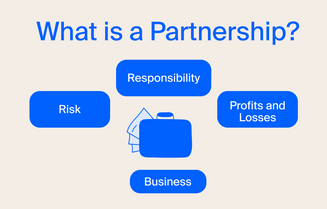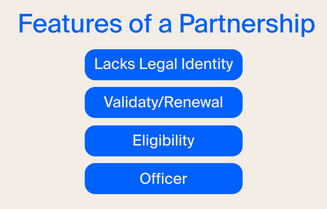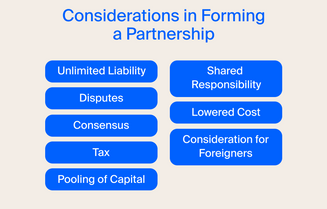Setting Up a Partnership in Singapore: A Comprehensive Guide
- Modified: 10 October 2023
- 9 min read
- Starting a Company


Francesca Del Giudice
Author
Francesca is a content creator with more than 10 years of experience across multiple industries, including academic research, consulting, venture, and tech startups. She combines this diverse background with a talent for translating complex ideas into clear, practical content for Singapore entrepreneurs and business readers. Francesca’s work empowers readers to understand emerging trends, make informed decisions, and apply actionable insights across business and innovation.
A partnership is a fairly simple business structure that involves more than one partner. Setting one up in Singapore is not complicated. There are a few important things to be aware of, especially around shared responsibilities and legal liability. In this comprehensive guide, we explain how to create a partnership.
What Is a Partnership?

A partnership is a business structure in Singapore where two or more individuals come together to form a profit-making enterprise. It’s a step up from a sole proprietorship with only one registered owner.
The partners are not considered separate legal entities from the business. This makes the partners personally liable for any liabilities or claims against the business. For this reason, it's not always a recommended structure to choose. There are two forms of partnerships in Singapore, each with its own pros and cons.
Considering a partnership? Our company incorporation services can help you navigate the complexities of business formation and ensure that your partnership is set up correctly from the start, minimising risks and maximising opportunities for growth.
How Does a Partnership Work?

When forming this type of business, a legal document (the partnership agreement) is drawn up, which clearly outlines each partner’s equity contribution, roles and management responsibilities, the distribution of profits and losses, how decisions will be made and how the enterprise will be dissolved. All liabilities and obligations are the partners' responsibility, in line with the terms of the agreement and the type of partnership formed.
Partnerships are relatively easy to set up and are often used by small businesses, such as law firms or accounting firms. It is important to note that each partner is fully responsible for the actions of the other partners, so it is crucial to choose partners carefully and to have a clear agreement in place before disputes arise.
Types of Partnership
In Singapore, there are two main types to choose from: a general partnership (GP) and a limited partnership (LP). There are a few fundamental differences between them, particularly around the number of partners allowed, responsibilities and exposure to liability.
General Partnership (GP)
A general partnership is the more common and simpler legal structure. It’s quick to set up and just as simple to dissolve. A GP can have no more than twenty partners.
To form a GP in Singapore, two or more individuals enter into a partnership agreement that sets out the terms. The agreement should specify the name of the GP, the purpose of the business, and the initial capital contribution of each partner.
All partners have an equal right to make decisions and manage the business unless otherwise agreed upon in the agreement. Management responsibilities may be delegated to partners, or employees can be hired to manage the daily operations.
In a GP, each partner is personally liable for any liability that may arise. This means that if the partnership is unable to pay its debts, creditors can go after the personal assets of each owner to satisfy the debt. This is why a GP is not a recommended option, as each partner can be held responsible for the actions of another.
A GP in Singapore can be dissolved by mutual agreement of the partners or by death or bankruptcy. Upon dissolution, the assets of the partnership must be sold, and the proceeds must be shared with the partners in accordance with the terms of the agreement.
Limited Partnership (LP)
A limited partnership (LP) has two types of partners: a general partner and a limited partner. An LP has no restriction on the number of partners allowed, but there must always be at least one general and one limited partner.
Limited partners are only liable for any claims against the business to the extent of their agreed capital contribution. Their liability is limited. They do not have the right to participate in management duties, but they may receive a share of the profits. A limited partner can be an individual, company or foreign-owned company.
General partners are responsible for managing the day-to-day operations of the LP and have unlimited liability for the debts and obligations against the business. They are also responsible for ensuring that the LP complies with all legal and regulatory requirements.
A limited partnership agreement (LPA) is required to start an LP. The agreement should include the purpose of the LP, partner capital contributions, terms of profit and loss distributions, management of the LP and how the entity will be dissolved.
An LP can be dissolved when its term expires, as specified in the LPA, by mutual agreement between the partners, death, insolvency or breach of contract, or by court order.
Features of a Partnership

Lacks Legal Identity
Much like a sole proprietorship, partnerships are not considered to be separate legal entities from the owners. They are therefore limited in their legal capacity. Neither a GP nor an LP can own property in the business's name. An LP cannot sue or be sued in its name, whereas a GP can.
Validity/ Renewal
Registration is only valid for one or three years and must be renewed within sixty (60) days of expiry. You can only renew for three years if specific Medisave requirements are met. The renewal fee is non-refundable and can be paid online via BizFile.
Eligibility
To be eligible to register a partnership in Singapore, you must be 18 years or older and either a citizen, permanent resident or eligible FIN holder.
If you're self-employed, your Medisave account must be topped up and up to date.
If you're a foreigner, you must appoint at least one local, authorised representative.
Officer
An officer of a partnership must be 18 years or older, a natural person and a resident of Singapore. If all the partners are outside of Singapore, then an authorised representative (or manager) must be appointed. This can be done on BizFile.
Registered Address
A local address in Singapore is required to register, operate and renew a partnership. This applies to both a GP and LP.
Taxation
Because there’s no legal separation between the entity and its owners, a partnership doesn’t pay tax. Instead, each partner will pay tax on their portion of the profits on their individual tax return. Where a corporation is a partner, the profit share will be taxed under their corporate tax rate.
Continuity
Both forms of partnership can cease to exist if the registration expires or if all partners mutually agree to close the business. Unexpected events, such as death, can also dissolve the enterprise. A cessation notice must be filed with ACRA if trading is ceased.
Limitation
A partnership cannot register or own another entity as it is not a legal entity of and in itself, and therefore has no capacity to enter into ownership agreements.
Documents Required in Setting up a Partnership
Creating a partnership in Singapore requires the following documents:
- Proof of identity for each partner (e.g. passport or NRIC)
- For a company partner, the registration information of the company
- Proof of residential address for each partner (e.g., utility bill or bank statement)
- An approved trading name
- A partnership agreement
- A registered business address in Singapore
- Declaration of compliance
Consent to Act as Manager and Declaration of Non-Disqualification of Act as Manager
Registration must be lodged with ACRA and should be completed within one business day, provided there are no errors with documentation, or no other government agencies are required to review the application. If successful, the applicant will be notified via email and receive a registration number.
Key Considerations in Forming a Partnership

1 Unlimited Liability
Unlimited liability is one of the main disadvantages of a partnership firm. In a GP, all partners can be held liable, which puts you at risk of the actions taken by other partners. An LP provides some level of protection to the limited partners only, but that comes at the expense of not being allowed to partake in the management of the business.
2 Disputes
There are often different types of partners in a partnership. This can lead to disputes over hiring, expansion, profit distribution and closing the business. It’s important that the legal agreement clearly explains how decisions will be made and how disputes will be handled and mediated. The agreement should also be reviewed periodically to keep it up to date.
3 Consensus
It’s unlikely that partners will be able to agree on every decision, all the time. The partnership agreement should clearly define how decisions will be made. In some cases, the agreement can allocate rights to certain partners, usually based on their capital contribution, giving them a larger vote. The agreement can also permit certain, less important decisions, to be made without consensus.
4 Tax
Tax is another reason that registering a partnership can be unattractive. Partners will pay tax on their share of the profits, in their personal capacity. If you fall into a high-income tax bracket, you could be paying significantly more than a company. This is something worth considering before choosing your business structure.
5 Pooling of Capital
One of the obvious benefits of a partnership is the ability to achieve more with pooled resources and capital. Because obtaining financing can be more difficult as a sole proprietor, and even as a partnership, this is one of the advantages of a partnership firm. In an LP, additional limited partners can be added to contribute capital, without requiring any management in the business.
6 Shared Responsibility
Partners can benefit from sharing the responsibility that comes with running a business. At the same time, in a GP, the negative actions of one partner will also be shared by all others.
7 Lowered Cost
A partnership is a more affordable business structure to set up — cheaper than a corporation. The ongoing compliance and administration fees are much lower, saving you money and time.
8 Consideration for Foreigners
As a foreigner, you can register a partnership in Singapore, but you must appoint a local, authorised representative or manager. Not being present can expose your business to mismanagement, though. If you intend to relocate to Singapore, you should consult the Ministry Of Manpower (MOM) before applying. The rejection rate for employment passes is high.






